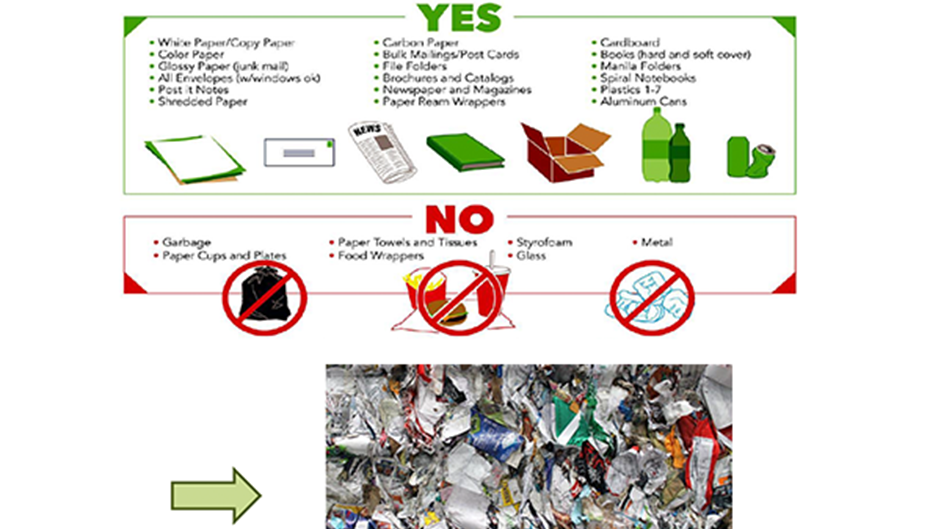Researchers from the University of Miami College of Engineering (UM CoE) are advancing their innovative research on improving the efficiency of single-stream recycling with funding from the Reducing EMbodied-Energy and Decreasing Emissions (REMADE) Institute.
REMADE is a USA Manufacturing Institute public/private partnership with the U.S. Department of Energy. It brings together leading universities and companies to work on early-stage applied research and development of clean energy projects that are considered critical to the nation’s manufacturing competitiveness.
“The recycling industry and, in particular, the paper recycling industry has been changing, and an important part of this change is the switch to single-stream recycling” said Nurcin Celik, an associate professor in the UM CoE Department of Industrial Engineering. “Many counties and cities nationwide have placed great emphasis on this change and transitioned from the dual- or multi- stream to the single-stream recycling program. As a team, we are finding ways of expanding and improving the efficiency with which they can be extracted and reprocessed, as well as improving processes for single-stream recycling.”
Celik is leading the team of researchers on the CoE project. They will analyze and document contamination in single-stream recycling and develop recommendations of best practices for facilities that process single-stream recycling. Their aim is to investigate how recycling systems can minimize contamination and maximize the amount of material that gets recycled. Their project, titled “Assessment of the Impact of Single-Stream Recycling on Paper Contamination in Recovery Facilities and Paper Mills,” will use data from throughout the Southeast, Northeast and Western U.S.
Single-stream recycling is a system in which all paper fibers, containers, glass and plastic are mixed together in a single container when prepared for recycling. Since it is much easier to use a single recycling container than to sort recyclables, it increases household as well as end user participation in collection. And, since it is easier to dump one container into a collection truck with one compartment, it saves municipalities money in collection.
“Overall, single-stream recycling is very convenient for the end user,” Celik said. “However, putting all the materials into a single bin may impose higher level of contamination due to the propensity to toss non-approved materials into the recycling bin, ultimately causing significant problems for material recovery facilities and communities.”
However, Celik’s early research found that there may be more contaminants such as grit, liquids and other non-recyclable materials in single-stream recycling than there are in pre-sorted recycling. Contaminants increase the cost of overall recycling, may lead to lower-quality post-recycled materials, cause otherwise-recyclable materials to be un-recyclable and can damage recycling machinery.
Through work conducted at her Simulation and Optimization Research Laboratory (SimLab) at the College, Celik and her team of scientists will seek to identify factors that affect the contamination of recyclable materials, both before they arrive at facilities designed for single-stream recycling and after they leave those facilities. They’ll study factors including collection modes and strategies, demographics (such as household participation rates in curbside recycling collection), input volumes and technology. Celik and her researchers will also identify and evaluate emerging technologies and practices that can further reduce contamination rates of recycled products from single-stream recycling facilities.
Celik’s research is also funded and assisted by expertise and data from industry partners including Resource Recycling Systems (RRS), the American Forest and Paper Association (AF&PA), and the Institute of Scrap Recycling Industries (ISRI)
“We have three very strong collaborators,” Celik said. “These partners will help us shape the project by locating and collecting data, as well as by providing us critical feedback. Such an industry collaboration lies at the foundation of REMADE’s mission as well.”
This dovetails with REMADE’s mission of involving industry partners in funding research. REMADE’s mission is to develop industrial platform technologies that can dramatically reduce the embodied energy and carbon emissions associated with industrial-scale materials production and processing. Ultimately, it hopes to motivate industry investment in further advancing the technologies, which will also support the U.S. manufacturing ecosystem.
This research is funded through REMADE by the U.S. Department of Energy’s (DOE) Office of Energy Efficiency and Renewable Energy (EERE) under the Advanced Manufacturing Office (Award Number DE-EE0007897). Cost-share equal to the DOE funding is provided by the research partners.

